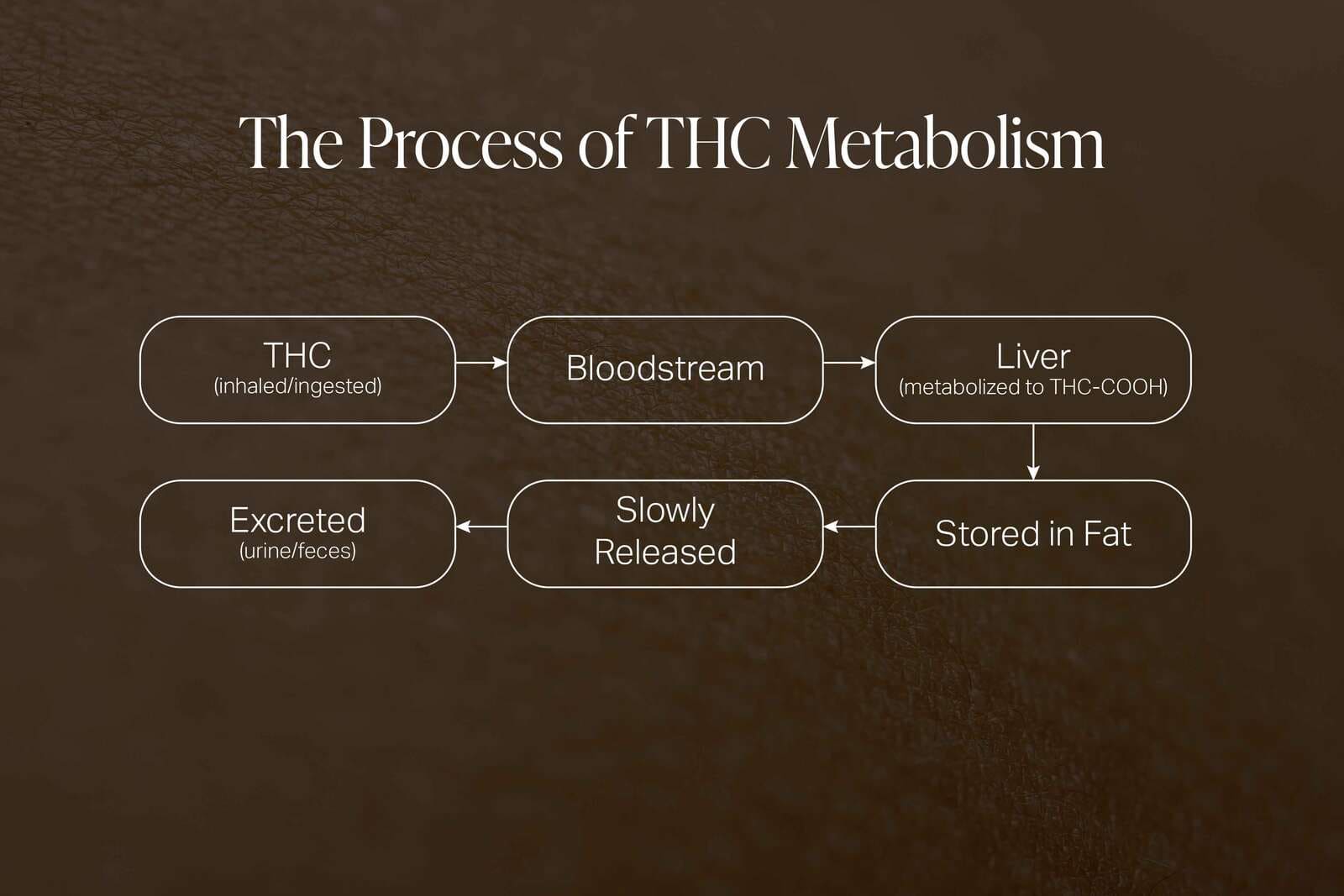Table of Contents
The length of time marijuana remains in your system after quitting is determined by a combination of biological factors, usage patterns, and the sensitivity of the drug test being used. The primary psychoactive compound in cannabis, tetrahydrocannabinol (THC), is fat-soluble, meaning it binds to fat cells in your body. Because it’s stored in fat, THC and its metabolites can be detectable for days, weeks, or even more than a month after the last use, depending on how much and how often you consume cannabis.
Understanding how long THC stays in your system is essential for people facing workplace or legal testing, as well as for those in recovery who want to manage cravings and track progress.

How THC Is Processed in the Body
After consuming marijuana — whether by smoking, vaping, or eating an edible — THC enters the bloodstream and travels to the brain, where it binds to cannabinoid receptors in the endocannabinoid system. This produces the well-known psychoactive effects, such as euphoria, altered time perception, and changes in coordination.
Once in the body, THC is broken down in the liver into metabolites such as THC-COOH, which are stored in body fat and gradually released back into the bloodstream. From there, they are eliminated primarily through urine and feces.
- Onset of Metabolism: Begins within minutes after smoking and within an hour or two after eating an edible.
- Storage in Fat: THC is retained in fat cells, which makes elimination slower compared to water-soluble substances.
- Slow Release: Fat cells gradually release THC metabolites, which are then processed by the liver and excreted.

Detection Times by Testing Method
Different drug testing methods detect THC for varying lengths of time. The more sensitive the test, the longer THC can be found in the body.
- Urine Tests:
- Occasional users (once a month or less) – Detectable for 3–7 days.
- Moderate users (a few times a week) – Detectable for 7–21 days.
- Heavy daily users – Detectable for 30 days or more.
- Blood Tests:
- Detectable for 1–2 days in occasional users.
- Up to 7 days in chronic heavy users.
- Saliva Tests:
- Detectable for 24–72 hours for most people.
- Hair Tests:
- Detectable for up to 90 days, but this shows long-term exposure, not recent impairment.
These ranges are averages. Individual results vary based on metabolism, body composition, and the potency of the marijuana used.
Factors That Influence How Long THC Stays in Your System
While the type of test plays a big role, personal factors also make a significant difference in detection times.
- Frequency of Use: The more often you use marijuana, the more THC accumulates in fat cells.
- Body Fat Percentage: Higher body fat can prolong detection windows because THC binds to fat.
- Metabolic Rate: A faster metabolism processes and eliminates THC metabolites more quickly.
- Potency of Product: Concentrates and high-THC strains result in higher levels of metabolites.
- Hydration Levels: While drinking water can help with general health, it does not drastically shorten detection time.
Can You Speed Up THC Elimination?
Despite many myths, there is no magic solution for instantly clearing THC from your body. Still, certain habits can support your natural detox process:
- Stay Hydrated: Water helps your kidneys function optimally and supports general detoxification.
- Exercise Regularly: Cardio and strength training can help reduce body fat, gradually lowering THC storage.
- Eat Nutrient-Dense Foods: A balanced diet supports liver health, which is critical for metabolizing THC.
- Get Adequate Sleep: Recovery and detox processes are more efficient when the body is well-rested.
It’s important to note that these actions support health but do not override the body’s natural elimination rate. For many people, especially heavy users, the only true solution is time.
For those who struggle to quit or are concerned about relapse, enrolling in a marijuana addiction treatment program can provide the structure, accountability, and coping strategies needed to sustain recovery.

Why Understanding Detection Matters
For individuals in recovery, knowing how long THC remains in the body can help manage expectations and reduce anxiety about drug testing. It also helps people avoid the misconception that they are “clean” as soon as the high fades. THC metabolites may be present long after impairment ends, meaning someone could fail a drug test despite not being under the influence.
This knowledge is particularly important for those in professions with strict drug policies, athletes subject to testing, and people in court-ordered sobriety programs.
Potential Health Impacts of Prolonged THC Storage
While the presence of THC metabolites in fat cells does not mean you’re impaired, long-term storage may have indirect effects. Regular marijuana use can affect motivation, memory, and mental health, particularly in those who begin using heavily during adolescence. For some, THC stored in the body may be slowly released, potentially causing mild, lingering effects on mood or cognition, though research in this area is ongoing.
The Role of Lifestyle in Recovery
Recovery from marijuana dependence often involves more than just stopping use. Building a healthy lifestyle — including regular exercise, balanced nutrition, and stress management — not only supports the detox process but also strengthens your ability to maintain long-term sobriety.
Looking at the Bigger Picture of Marijuana Use
What Is THC and How Does It Affect the Brain?
THC binds to receptors in the brain that control mood, memory, and perception, which can alter short-term mental function and long-term brain health.
Is Cannabis Addictive Physically or Mentally?
While physical withdrawal symptoms are mild, the psychological pull can be significant, especially for daily users.
How Long Does It Take to Detox from THC Naturally?
The natural detox timeline depends on frequency of use, body fat, and overall health.
Can You Speed Up THC Detox and Pass a Drug Test?
Supporting health through diet and exercise can help, but only time can fully eliminate THC.











